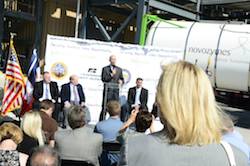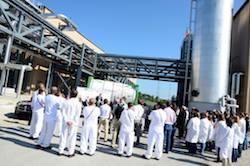On Friday, Nebraska Governor Pete Ricketts rallied for the Renewable Fuel Standard (RFS) in Blair, Nebraska at Novozymes’ biofuel enzyme facility. Also in attendance was Iowa Lieutenant Governor Kim Reynolds, Nebraska Farm Bureau President Steve Nelson and Kyle Nixon, Novozymes general manager. According to speakers, should the Environmental Protection Agency’s (EPA) final rule that slashes the required volumes of corn ethanol by more than one million gallons move forward, it will threaten thousands of jobs and billions of dollars of investments by ethanol producers in Nebraska and Iowa.

Nebraska Governor Pete Ricketts speaks about the RFS during a rally held at Novozyme’s enzyme facility in Blair, Nebraska. Photo Credit: Novozymes.
“Agriculture is Nebraska’s number one industry, and ethanol is one of the key agricultural growth industries that have added billions in revenue and thousands of jobs over the past decade to our state,” said Gov. Ricketts. “These efforts were undertaken in expectation that such efforts would meet the commitment of this nation to renewable fuels established by the Renewable Fuel Standard. Nebraskans have cause for concern because the EPA’s proposal to slash billions of gallons of biofuels from the RFS has the potential to negatively impact the future growth of our state. The RFS is an achievable and ambitious target and must be maintained.”
Today is the last day for public comment on the rule and more than 200,000 comments alone were submitted today by Fuels America. Earlier this year the association released an economic study citing the RFS driving $184 billion in economic activity, 850,000 jobs and $46 billion in wages across the country. This activity, found the report, creates a ripple effect as supplier firms and employees re-spend throughout the economy. The local impact for Nebraska is $11.1 billion and nearly 40,000 jobs. Likewise, the impact for Iowa is $19.3 billion and 73,000 jobs.
Today the U.S. biofuels industry produces 14 billion gallons of ethanol and biodiesel.
According to Nixon, enzymes from Novozyme’s Blair, Nebraska plant allow agricultural products like corn starch and corn stover to be converted into conventional and advanced biofuels. He noted the facility has helped realize two of the Obama Administration’s key goals for renewable energy; creating short-term construction and long-term professional jobs; and helping move the U.S. away from foreign oil and towards homegrown renewable fuel, energizing the economy and increasing domestic security.

Novozymes’ biofuels enzyme facility in Blair, Nebraska hosted a RFS rally on Friday, July 24, 2015 in support of renewable fuels. Photo Credit: Novozymes.
“The RFS is not just a policy it’s how we live our lives. Today Novozymes has 127 full time employees in Nebraska and Iowa–jobs that were created in large part, due to the RFS,” said Nixon. “We care deeply for our communities and want to see benefits like jobs, worker training and tax revenues continue to grow.”
“EPA’s decision to not follow the intent of Congress when it developed the RFS2 in 2007 is highly disappointing to all of agriculture,” added Steve Nelson, president of the Nebraska Farm Bureau. “Renewable fuels, more specifically corn based ethanol, has been a tremendous success story for the nation as a whole as well as to Nebraska’s rural economy. The RFS has reduced our country’s dependence on foreign crude oil, reduced air pollution, increased farm incomes and has provided good paying jobs within rural America. EPA’s proposal is a step in the wrong direction and ignores the benefits ethanol and biofuels have provided.”

